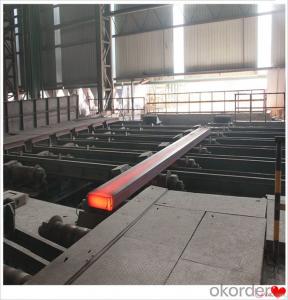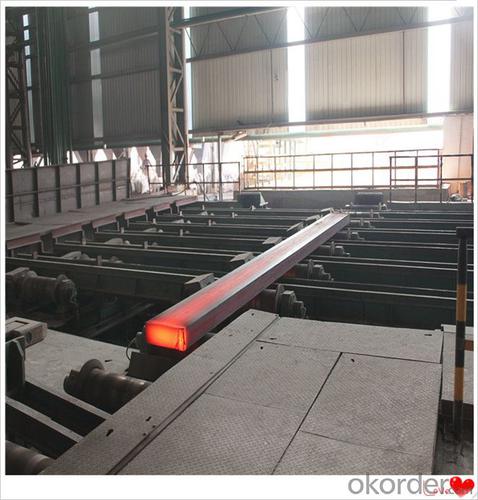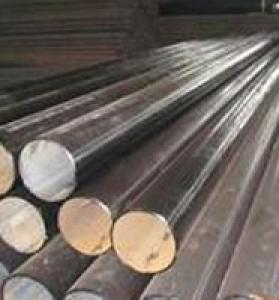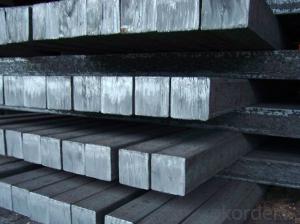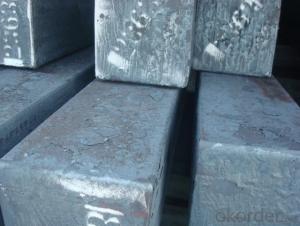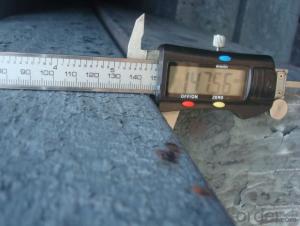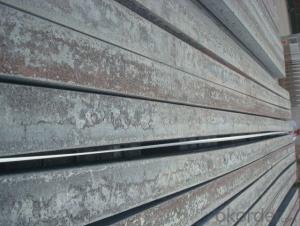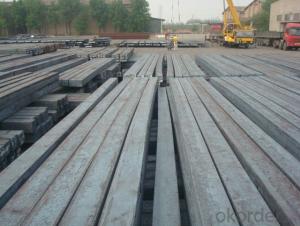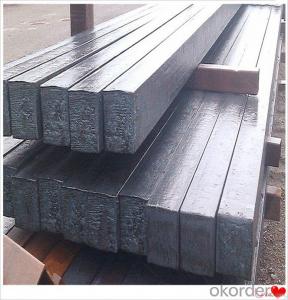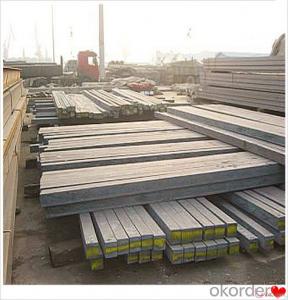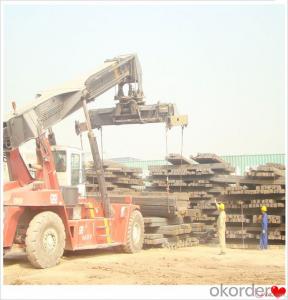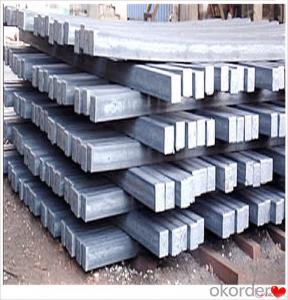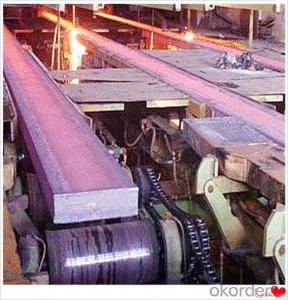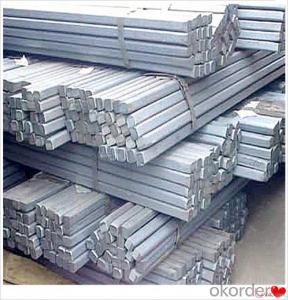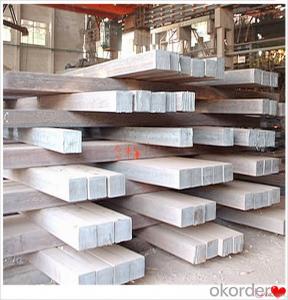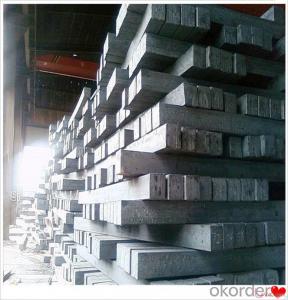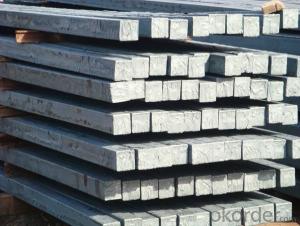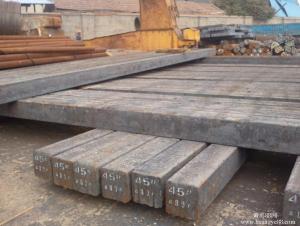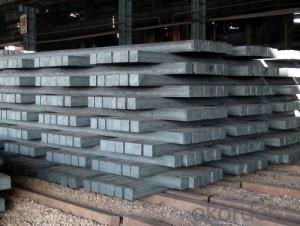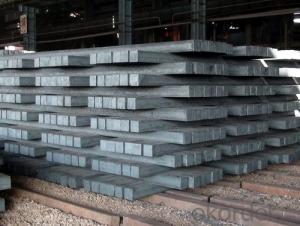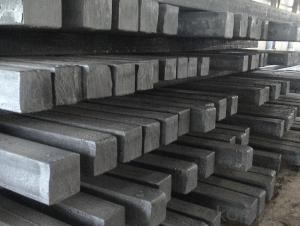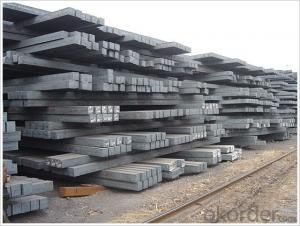Billet Continuous Casting Machine Q235,Q255,Q275,Q345,3SP,5SP,20MnSi
- Loading Port:
- China main port
- Payment Terms:
- TT OR LC
- Min Order Qty:
- 20 m.t.
- Supply Capability:
- 200000 m.t./month
OKorder Service Pledge
OKorder Financial Service
You Might Also Like
Billet Continuous Casting Machine Q235,Q255,Q275,Q345,3SP,5SP,20MnSi
Specification
Steel billet(ingot) by cogging or breakdown of semi-finished products, is the raw material of all kinds of steel mill. Billet section of square, round, flat, rectangular and abnormity of several kinds of, mainly related to the shape of rolled products.
CNBM Q235,Q275,Q345,3SP,5SP,20MnSi Billets Steel
Hot Rolled Steel Billets/ Mild Steel Bar/ Billet Steel
Specification (see below)
Standard: GB/JIS/ASTM
Size: 50*50mm-180*180mm
Length: 3-12mtrs or Customised
Steel material: Q235,Q255,Q275,Q345,3SP,5SP,20MnSi
Technique: Hot rolled
FOB Unit Ton Price $250-350 and Usually I will quote you CFR price.
MOQ: Usually 1000-10000MT/size
Shipment:By Container,Bulk Vessel
Packaging Details: bundles with steel strips or as customers's requirements
Delivery time: Usually within 30 days after the deposit/LC
Inspection:Third party inspection before loading.
Technical data
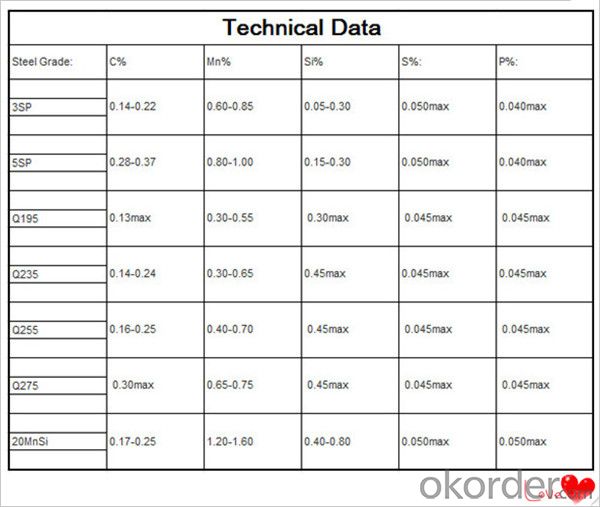
Feature Steel Billet
Rectangular billet continuous casting billet and mainly general carbon steel, low carbon low silicon cold-rolled material, high quality carbon structural steel, high strength low alloy steel, special steel, etc.
The billet is mainly divided into two kinds from the shape:
Slab: cross section width and height of the ratio of the larger, mainly used for rolling plate.
Billet: equal cross section width and height, or a huge difference, mainly used for rolling steel, wire rod. ,
Steel billets have distinct characteristics as compared with already furnished steel bars and products. Billets have a specific grain structure, which enables the metal to be processed more intricately. Steel billets are also known for their malleability and ductility, especially when exposed to varying temperatures during shaping and molding.
Packaging & Shipping
1. Packaging:
1) Small size: in bundles
2)Big size: in bulk
3)in plastic packing or as per customer requirement
2. Delivery time:
1) Normal size: within 7days send from warehouse directly
2) Special size: with 25-30days customer made for you
3. Trade terms:FOB/CFR/CIF
4. Shippment:
1) length:≤5.8m loaded in 20FT Container with 25-27tons
2) length:≤11.8m loaded in 40FT Container with 25-27tons
3) lengnth:≥12m shipped by bulk vessel, FILO terms
Steel Billet Images
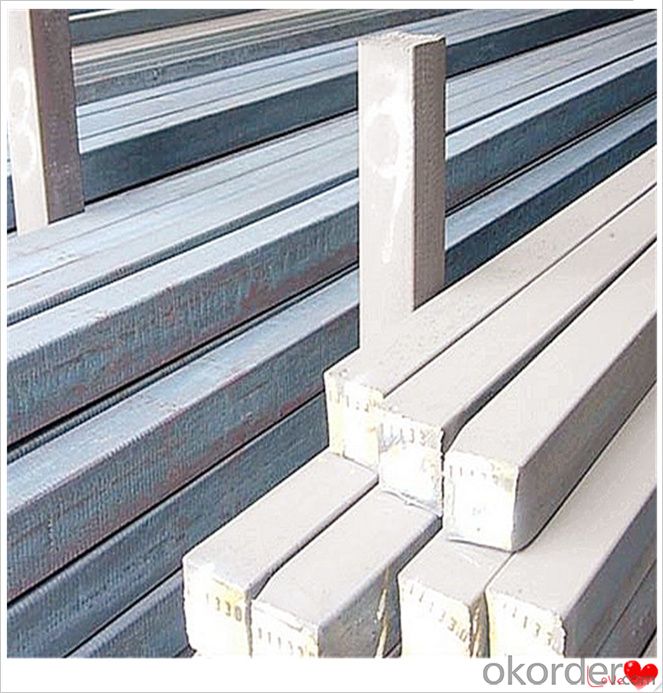
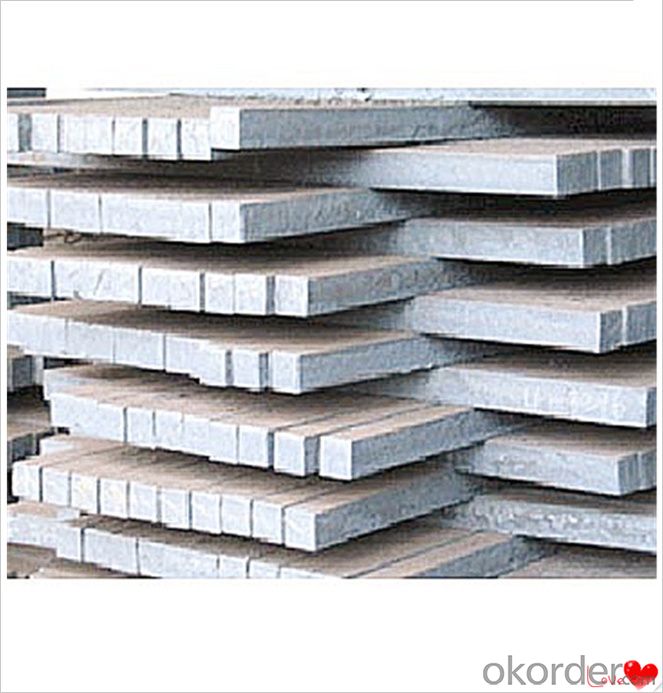
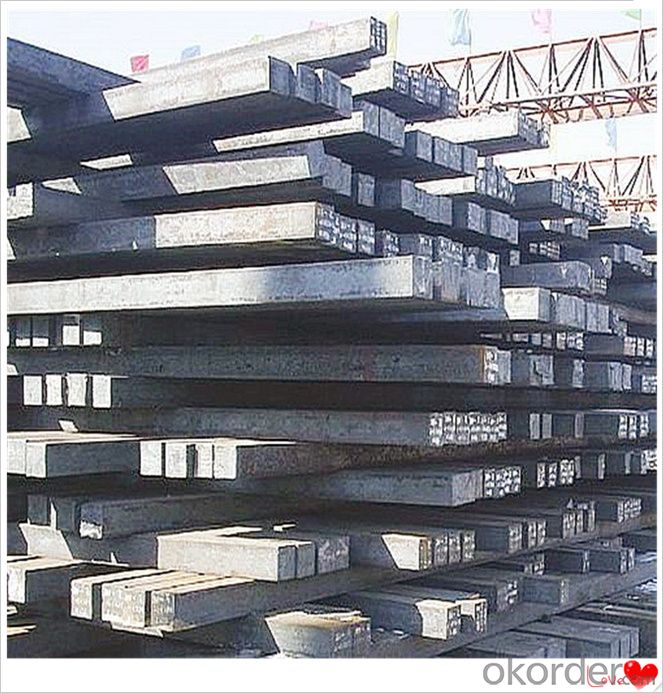
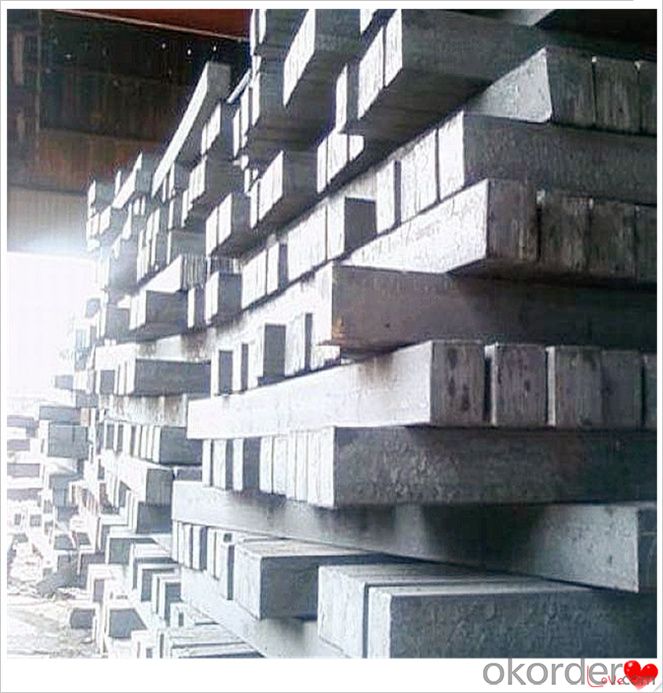
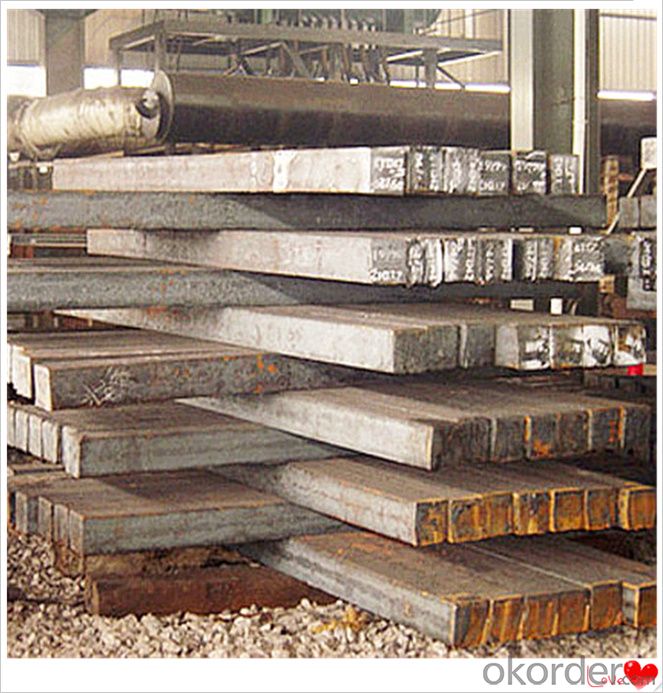
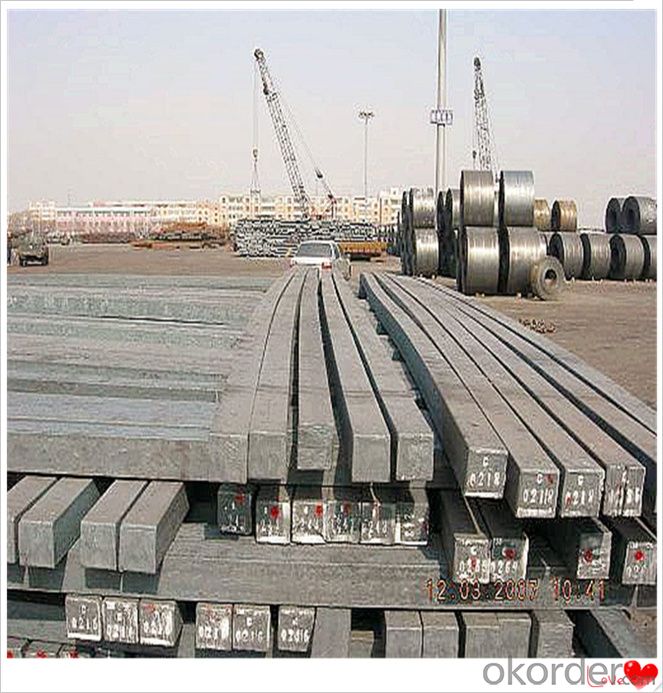
Processing
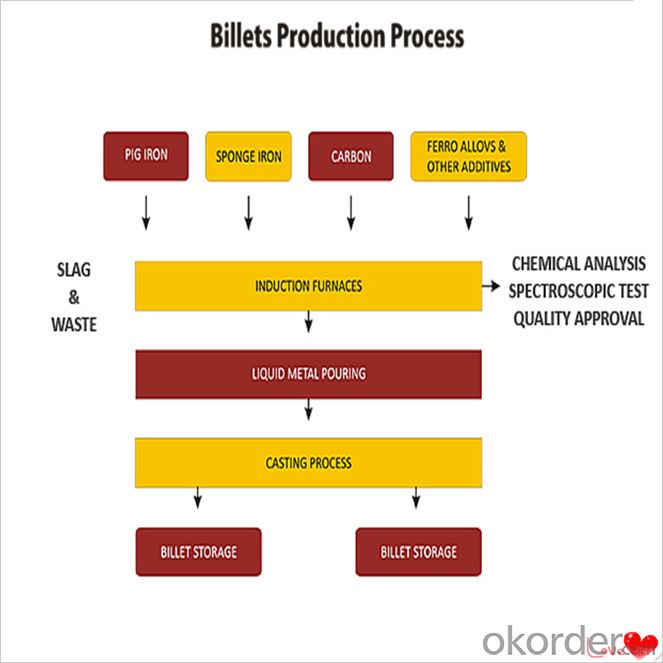
Usage-Billet Steel
Used for the plant, the bridge,shipment building high-rise building construction,lifting and transportation machinery, equipment manufracturing base building the support foundation pile manufacturing.
Billets, or ingots (as they sometimes referred to), are not of practical use until they have been formed into more functional shapes and sizes. While they have already been put in the furnace, they still require a series of shaping and molding procedures such as hot and cold working, milling and cutting before they are sold in hardware stores, or used for different applications. The unformed billets, however, can be used in striking currency such as coins and as reserves, similar to gold bars.
FAQ-Billet Steel
We have organized several common questions for our clients,may help you sincerely:
1) How about your company?
A world class manufacturer & supplier of castings forging in carbon steel and alloy steel,is one of the large-scale professional investment casting production bases in China,consisting of both casting foundry forging and machining factory. Annually more than 8000 tons Precision casting and forging parts are exported to markets in Europe,America and Japan. OEM casting and forging service available according to customer’s requirements.
2) How to guarantee the quality of the products?
We have established the international advanced quality management system,every link from raw material to final product we have strict quality test;We resolutely put an end to unqualified products flowing into the market. At the same time, we will provide necessary follow-up service assurance.
3) How long can we receive the product after purchase?
In the purchase of product within three working days, We will arrange the factory delivery as soon as possible. The pecific time of receiving is related to the state and position of customers.Commonly 7 to 10 working days can be served.
4)Do you have your own QC department?
Yes, we have, our QC department will inspect the goods during the process of mass production and after completion of production.
hot sale!!! Cast Steel Grades/ mild steel bar/ billet steel
(1): High quality steel with reasonable price.
(2): Wide excellent experiences with after-sale service.
(3): Every process will be checked by responsible QC which insures every product's quality.
(4): Professional packing teams which keep every packing safely.
(5): Trial order can be done in one week.
(6): Samples can be provided as your requirements.
- Q: How are steel billets labeled for identification purposes?
- Steel billets are typically labeled for identification purposes through various methods such as stamping or tagging, where important information such as size, grade, heat number, and production date are marked directly on the billet or attached to it. This labeling allows for easy traceability and identification throughout the manufacturing and supply chain processes.
- Q: How to purchase suitable billet heating furnace
- Billet heating furnace manufacturers are many, the procurement of cost-effective equipment is the user's best choice. Choice can not be blind, you can not just look at the price, the choice of advice you consult more manufacturers, and then use the exclusion method to determine your final goal. Online can take a look at live video, more reference.
- Q: What are the main factors affecting the corrosion resistance of stainless steel billets?
- The corrosion resistance of stainless steel billets is affected by various factors. These include the composition of the alloy, the presence of impurities, the manufacturing process, and the environment in which the billets are exposed. The alloy composition is crucial in determining the corrosion resistance of stainless steel. The addition of elements like chromium, nickel, and molybdenum enhances its resistance to corrosion. These elements create a protective oxide layer on the surface, acting as a barrier against corrosive agents. Impurities in the stainless steel billets can also impact their corrosion resistance. For instance, the presence of sulfur can lead to the formation of sulfide inclusions, reducing overall corrosion resistance. Therefore, controlling impurities during the manufacturing process is vital for optimal corrosion resistance. The manufacturing process employed to produce stainless steel billets can also affect their corrosion resistance. Factors such as temperature, cooling rate, and the presence of contaminants during production influence the material's microstructure, thus impacting its corrosion resistance. Lastly, the environment in which the stainless steel billets are exposed plays a significant role in their corrosion resistance. Variables like temperature, humidity, pH level, and the presence of corrosive agents like acids or chlorides can expedite the corrosion process. Therefore, considering the specific environmental conditions is crucial when selecting stainless steel billets for a particular application. In conclusion, the corrosion resistance of stainless steel billets is influenced by the alloy composition, impurities, manufacturing process, and environment. By carefully considering these factors, one can select stainless steel billets with optimal corrosion resistance for various applications.
- Q: How are steel billets used in the production of machinery and equipment?
- Steel billets play a crucial role in the manufacturing of machinery and equipment. They serve as the primary material from which different parts and components are formed. The production process begins by carefully selecting high-quality steel billets, which are then heated and shaped through techniques like hot rolling, forging, or extrusion. One important application of steel billets is seen in the production of machine parts, including gears, shafts, and axles. These billets are heated to a specific temperature, making them easy to manipulate and shape according to desired specifications. Once shaped, these parts undergo further processing, such as heat treatment or machining, to enhance their strength, durability, and precision. Steel billets are also extensively used in the manufacturing of heavy machinery and equipment. For example, in the construction industry, they form the foundation for the production of cranes, excavators, and bulldozers. By molding and shaping these billets into various structural components, the necessary strength and stability are provided for these equipment to perform arduous tasks. Additionally, steel billets find application in the production of industrial machinery, such as turbines, compressors, and pumps. Through intricate shaping, these billets acquire high strength, corrosion resistance, and the ability to withstand extreme operating conditions. The properties of steel, such as its high strength, durability, and versatility, make it an ideal material for the manufacturing of machinery and equipment. Steel billets act as the starting point for the production process, enabling manufacturers to create complex and dependable components that are vital for the operation of machinery and equipment in diverse industries.
- Q: What are the main applications of steel billets?
- Steel billets, which are semi-finished products, find application across a range of industries. The primary uses of steel billets include: 1. Construction: Structural steel production in the construction industry heavily relies on steel billets. Beams, columns, and other load-bearing elements in buildings and infrastructure are manufactured using steel billets. Their use in construction projects ensures strength, durability, and high load-bearing capacity. 2. Manufacturing: Steel billets serve as raw materials in the manufacturing industry for various metal products. Pipes, tubes, rods, wires, and other metal components are commonly manufactured using steel billets. The versatility of steel billets allows for easy shaping and forming into different sizes and shapes, making them ideal for manufacturing purposes. 3. Automotive Industry: The automotive industry extensively uses steel billets for producing components and parts. Engine parts, chassis components, suspension systems, and other critical automotive components are manufactured using steel billets. Steel billets offer exceptional mechanical strength and heat resistance, making them suitable for demanding automotive applications. 4. Machinery and Equipment: Steel billets are also utilized in the machinery and equipment industry for manufacturing gears, shafts, bearings, and other components requiring high strength and durability. Steel billets can withstand heavy loads and provide excellent resistance to wear and tear, making them essential for machinery and equipment manufacturing. 5. Energy and Oil Industry: The energy and oil industry widely employs steel billets in the production of pipes and tubes. Steel billets are used for constructing pipelines that transport oil, gas, and other fluids over long distances. The strength, corrosion resistance, and pressure containment provided by steel billets are crucial for such applications. In summary, the exceptional mechanical properties, versatility, and ability to be shaped into different forms make steel billets indispensable in various industries. Their applications span across construction, manufacturing, automotive, machinery, and energy sectors, contributing to the development and growth of multiple industries.
- Q: What are the main factors affecting the dimensional tolerances of steel billets?
- Various factors can influence the dimensional tolerances of steel billets. The manufacturing process itself is one of the main factors. The method employed to produce the billets, whether it be casting or hot rolling, can impact the final dimensions. Casting processes, for instance, can introduce variations in the cooling rate, thereby affecting the overall shape and size of the billets. Another crucial factor is the initial quality of the raw material. The composition and homogeneity of the steel utilized in billet production can contribute to dimensional variations. Impurities or uneven distribution of alloying elements can result in inconsistencies in the size and shape of the billets. The temperature maintained during the manufacturing process is also significant. High temperatures have the potential to cause thermal expansion, leading to dimensional changes in the billets. Proper control of cooling rates and the cooling process is vital to maintaining the desired tolerances. The design and condition of the manufacturing equipment can also impact dimensional tolerances. Adequate maintenance and calibration of machinery are essential to ensure consistent and accurate production. Lastly, external factors like handling and transportation can affect the dimensional tolerances of steel billets. Improper handling or rough transportation conditions can result in physical deformations or damage to the billets, leading to variations in their dimensions. In summary, achieving the desired dimensional accuracy in steel billets necessitates attention to factors such as the manufacturing process, raw material quality, temperature control, equipment condition, and handling and transportation practices.
- Q: What is the role of steel billets in the manufacturing of construction machinery?
- The exceptional strength and durability of steel billets make them crucial in the production of construction machinery. These semi-finished products, created from molten steel, can be shaped into various forms like bars, rods, or sheets, depending on the specific machinery being manufactured. The ability of steel billets to withstand heavy loads and extreme conditions is one of the primary reasons for their use in the construction machinery industry. Machinery like excavators, bulldozers, cranes, and loaders experience intense stress and pressure during operation. With their high-quality steel composition, steel billets provide the necessary structural integrity and resistance to deformation, ensuring the machinery can handle demanding tasks without compromising safety or performance. Additionally, steel billets offer excellent weldability, an essential characteristic in the manufacturing process of construction machinery. Welding is often required to join different components together, and the use of steel billets guarantees strong and reliable welds, contributing to the overall stability and longevity of the machinery. Furthermore, steel billets can be easily machined and formed into complex shapes, allowing for the production of intricate parts and components needed for construction machinery. This versatility empowers manufacturers to design and fabricate machinery with precise specifications, enhancing their functionality and efficiency on the job site. Moreover, steel billets are known for their resistance to corrosion and rust, making them ideal for construction machinery exposed to harsh environmental conditions like moisture, chemicals, and abrasive materials. This resistance ensures the longevity of the machinery, reducing maintenance costs and downtime. In conclusion, the strength, weldability, machinability, and resistance to corrosion of steel billets make them indispensable in the manufacturing of construction machinery. By incorporating steel billets into the production process, manufacturers can create robust and reliable machinery that can withstand heavy loads, extreme conditions, and perform efficiently in the construction industry.
- Q: How are steel billets inspected before they are used in production?
- Steel billets are inspected before they are used in production through a rigorous quality control process. This typically includes visual inspection to check for surface defects and dimensional accuracy. Additionally, non-destructive testing techniques such as ultrasonic testing or magnetic particle inspection are employed to detect internal flaws or cracks. Chemical analysis is performed to ensure the steel composition meets the required specifications. These inspections help ensure the integrity and quality of the billets before they are used in production.
- Q: How are steel billets used in the manufacturing of railway components?
- Steel billets are used in the manufacturing of railway components as they serve as the raw material for forging and shaping various parts like rails, wheels, axles, and other structural components. These billets are heated and then manipulated through processes like rolling and forging to obtain the desired shape and strength required for railway applications.
- Q: What is the role of steel billets in the manufacturing of storage systems?
- Steel billets play a crucial role in the manufacturing of storage systems as they serve as the raw material for the production of various steel components used in these systems. These billets are heated, rolled, and shaped to create beams, columns, and other structural elements that provide strength and stability to the storage systems. Additionally, steel billets can be further processed to create shelves, racks, and other storage components, ensuring durability and reliability in the overall design.
Send your message to us
Billet Continuous Casting Machine Q235,Q255,Q275,Q345,3SP,5SP,20MnSi
- Loading Port:
- China main port
- Payment Terms:
- TT OR LC
- Min Order Qty:
- 20 m.t.
- Supply Capability:
- 200000 m.t./month
OKorder Service Pledge
OKorder Financial Service
Similar products
Hot products
Hot Searches
Related keywords
